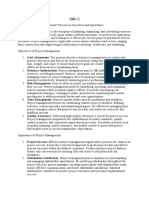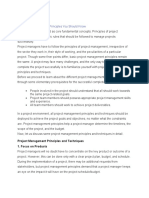Project Management
Project Management
Uploaded by
angelynhones05Copyright:
Available Formats
Project Management
Project Management
Uploaded by
angelynhones05Original Title
Copyright
Available Formats
Share this document
Did you find this document useful?
Is this content inappropriate?
Copyright:
Available Formats
Project Management
Project Management
Uploaded by
angelynhones05Copyright:
Available Formats
PROJECT MANAGEMENT
PROJECT
is a temporary and often customized initiative that consists of many smaller tasks and
activities that must be coordinated and completed to finish the entire initiative on time
and within budget.
In many firms, projects are the major value-creation process, and the major activities
in the value chain revolve around projects. Some examples are market research
studies, construction, movie production, software development, book publishing and
wedding planning.
In all project situations, projects require systematic management.
PROJECT MANAGEMENT
involves all activities associated with planning, scheduling, and controlling projects.
Good project management ensures that an organization's resources are used
efficiently and effectively.
Project management is becoming more important in achieving environmental, social, and
economic sustain-ability.
New jobs are emerging, having titles such as environmental project manager, health and
safety manager, environmental auditor, and sustainability compliance manager.
Project management skills are also essential to coordinate the multiple project disciplines
needed to successfully accomplish a project with complete or partial sustainability objectives
and desired outcomes.
THE SCOPE OF PROJECT MANAGEMENT
1. Define: Projects are implemented to satisfy some need; thus, the first step in managing a
project is to clearly define its goal, its responsibilities and deliverables, and when it must be
accomplished.
2. Plan: In this stage, the steps needed to execute a project are defined; it is determined who
will perform these steps; and the start and completion dates are developed.
3. Organize: Organizing involves such activities as forming a team, allocating resources,
calculating costs, assessing risk, preparing project documentation, and ensuring good
communications.
4. Control: This stage asses how well a project meets i god and objectives and mar cistents as
necessary.
5. Close: Closing a project involves compiling statistics, releasing and/or reassigning people,
and preparing a "lessons learned" list.
ROLES OF THE PROJECT MANAGER AND TEAM MEMBERS
PROJECTS MANAGERS
It is their job to build an effective team, motivate them, provide advice and support,
align project with the firms strategy and, direct and supervise the conduct of the
project from beginning to end.
Several principles can help project managers be successful:
Manage people individually and as a project team.
Reinforce the commitment and excitement of the project team.
Keep everyone informed.
Build agreements and consensus among the team.
Empower the project team.
ORGANIZATIONAL STRUCTURE
Some organizations use a PURE PROJECT ORGANIZATIONAL STRUCTURE whereby
team members are assigned exclusively to projects and report only to the project manager.
A pure functional organizational structure charters projects exclusively within functional
departments, such as manufacturing or research and development.
In a typical functional organization, a project cuts across organizational boundaries.
Assigning projects exclusively to functional areas makes communication across the
organization difficult and can limit the effectiveness of projects that require a systems
perspectives
A practical solution to this dilemma is a matrix organizational structure, which "lends"
resources to projects while still maintaining control over them.
Project managers coordinate the work across the functions.
This minimizes duplication of resources and facilitates communication across the
organization but requires that resources be negotiated.
Functional managers may be reluctant to provide the resources, and employees assigned to
projects might relegate a project to a lower priority than their daily functional job, making it
difficult for the project manager to control the project.
The Penalties of Poor Project Management
Not completing projects on time can have severe consequences.
You might also like
- Project Management 1Document84 pagesProject Management 1nithinnick66No ratings yet
- Unit 1Document10 pagesUnit 1Vansh MishraNo ratings yet
- Project Management 1Document7 pagesProject Management 1Geese GoNo ratings yet
- Operations: Management (TQM)Document35 pagesOperations: Management (TQM)ROSE ANNE BITANCURNo ratings yet
- Project Management Assignment Akase T.T. 21010131006Document13 pagesProject Management Assignment Akase T.T. 21010131006Weights MattersNo ratings yet
- Operation ManagementDocument6 pagesOperation Managementsafaa.sadek222No ratings yet
- I - Fundamentals of Project Management: A. Definition and BeginningsDocument7 pagesI - Fundamentals of Project Management: A. Definition and BeginningsPAUL JOHN PACULANANGNo ratings yet
- Project ManagementDocument5 pagesProject ManagementMichelle DupioNo ratings yet
- ITPM Chapter OneDocument14 pagesITPM Chapter OnegideyNo ratings yet
- Project ManagementDocument10 pagesProject Managementmustaphayassin510No ratings yet
- Introduction To Software Project ManagementDocument38 pagesIntroduction To Software Project ManagementAman guptaNo ratings yet
- Basics of Project ManagementDocument18 pagesBasics of Project ManagementPaul AllenNo ratings yet
- Discipline Planning Organizing Managing Resources Program ManagementDocument18 pagesDiscipline Planning Organizing Managing Resources Program ManagementRajiv PuttNo ratings yet
- PM VasquezDM A1Document7 pagesPM VasquezDM A1Djoanna Marie Tee VasquezNo ratings yet
- Project Management MR ChifambaDocument19 pagesProject Management MR Chifambabuiltenvirotech85No ratings yet
- Basics of Project ManagementDocument28 pagesBasics of Project ManagementManjul KadyanNo ratings yet
- What Are The Distinguishing Characteristics of Characteristics of Project? Why Project Management Important?Document5 pagesWhat Are The Distinguishing Characteristics of Characteristics of Project? Why Project Management Important?CHORE SYLIVESTERNo ratings yet
- Notes Sem2Document41 pagesNotes Sem2Karuna JainNo ratings yet
- PrintDocument2 pagesPrintstarkiller1234567890No ratings yet
- PJMT Assignment 01Document3 pagesPJMT Assignment 01zolilezondi14No ratings yet
- Jaycell Odencio HOMEWORKSWPP027Document2 pagesJaycell Odencio HOMEWORKSWPP027Christian Paul B. DalisayNo ratings yet
- It Project ManagementDocument66 pagesIt Project Managementpavantejareddy85No ratings yet
- Module 7 Final Essay 112123Document11 pagesModule 7 Final Essay 112123api-720078233No ratings yet
- Recognize The Role of Administration and Management in The Success of Programs and ProjectsDocument26 pagesRecognize The Role of Administration and Management in The Success of Programs and ProjectsCaren Frances HueraNo ratings yet
- An Introduction To Project ManagementDocument13 pagesAn Introduction To Project ManagementRohan BhuvadNo ratings yet
- Assignment Project ManagementDocument5 pagesAssignment Project ManagementTawfiqur RahmanNo ratings yet
- Introduction To Project ManagementDocument4 pagesIntroduction To Project Managementdollarsavinglk80No ratings yet
- PMD Pro Project ManagementDocument51 pagesPMD Pro Project Managementben100% (1)
- Teja ShriDocument20 pagesTeja ShriParbancha AmitNo ratings yet
- PMBok Short GuideDocument6 pagesPMBok Short GuideDagnachew TassewNo ratings yet
- Assignment No.6 Project ManagementDocument6 pagesAssignment No.6 Project ManagementPatricia CruzNo ratings yet
- What Is A ProjectDocument14 pagesWhat Is A ProjectQazi JunaidNo ratings yet
- Project ManagementDocument33 pagesProject ManagementThines KumarNo ratings yet
- Project Management PTC-Lecture 1Document40 pagesProject Management PTC-Lecture 1Faisal KhurshidNo ratings yet
- Project Management LectureDocument11 pagesProject Management LectureDan Gerico L. BacaniNo ratings yet
- Business Communication PresentationDocument11 pagesBusiness Communication PresentationLokesh VenkatramanNo ratings yet
- PM Unit-1Document6 pagesPM Unit-1Utsav SinghalNo ratings yet
- Project Management Pastor ChineduDocument101 pagesProject Management Pastor ChineduadeolaatekojaNo ratings yet
- Facilitator Guide - Managing by ProjectDocument50 pagesFacilitator Guide - Managing by ProjectJ Fax100% (1)
- Ruvimbo R Mushaninga-Project Management (BM404)Document10 pagesRuvimbo R Mushaninga-Project Management (BM404)MAXWELL gwatiringaNo ratings yet
- Qstion .2: What Is Project Management?Document6 pagesQstion .2: What Is Project Management?Mampise DepyeNo ratings yet
- PM Unit 1 Q & ADocument17 pagesPM Unit 1 Q & APriya Guna100% (1)
- Why Do You Say That Project Management Is The Best Method of Implementing ChangeDocument10 pagesWhy Do You Say That Project Management Is The Best Method of Implementing ChangeFaisal HameedNo ratings yet
- Module 8Document12 pagesModule 8isabel payupayNo ratings yet
- Project ManagementDocument8 pagesProject ManagementearlNo ratings yet
- Introduction To Project Management PDFDocument33 pagesIntroduction To Project Management PDFEbbyNo ratings yet
- Professional PracticeDocument12 pagesProfessional PracticeSage UniversityNo ratings yet
- Relevant Links: Project ManagementDocument7 pagesRelevant Links: Project ManagementKhursheed AhmadNo ratings yet
- Assignment 2015.PDF NewDocument18 pagesAssignment 2015.PDF Newyassin eshetuNo ratings yet
- Project ManagementDocument5 pagesProject ManagementSahil RazaNo ratings yet
- PME Unit 3Document19 pagesPME Unit 3negianuj070No ratings yet
- PMUDocument15 pagesPMUSæra HashmiNo ratings yet
- PM Lecture Topics 1 PM - Integration MGTDocument13 pagesPM Lecture Topics 1 PM - Integration MGTMohammad ali HassanNo ratings yet
- 15 Project Management Principles You Should KnowDocument8 pages15 Project Management Principles You Should KnowM iqbalNo ratings yet
- Assignment # 1: Submitted FromDocument16 pagesAssignment # 1: Submitted FromAbdullah AliNo ratings yet
- IntroductionDocument14 pagesIntroductioncy lifeNo ratings yet
- Project Management Institute Certification: Angel Edwards #71 - 0Document10 pagesProject Management Institute Certification: Angel Edwards #71 - 0api-277217137No ratings yet
- 551 NotesDocument6 pages551 NotesmdmvondomarceldesireNo ratings yet
- Notes 5Document10 pagesNotes 5Franclin Joël ZukoNo ratings yet
- Chemistry: PAPER 5 Practical Test InstructionsDocument4 pagesChemistry: PAPER 5 Practical Test InstructionsVarun PanickerNo ratings yet
- SPORTS WORLDS - 14 Enero 2013 - SantanderDocument14 pagesSPORTS WORLDS - 14 Enero 2013 - SantanderArthur CahuantziNo ratings yet
- Design Options For Transportation NetworkDocument14 pagesDesign Options For Transportation NetworkpinakNo ratings yet
- Molecular Vibrations of Crystal of Poly (Vinylidene: Fluoride)Document14 pagesMolecular Vibrations of Crystal of Poly (Vinylidene: Fluoride)Rana Sabouni TabariNo ratings yet
- WORK Immersion OBJECTIVESDocument3 pagesWORK Immersion OBJECTIVESDaniel Daniel Daniel50% (4)
- Technical Service Information: Automatic Transmission Service GroupDocument2 pagesTechnical Service Information: Automatic Transmission Service GroupVIDAL ALEJANDRO GARCIAVARGASNo ratings yet
- A Study On Performance Evaluation of Private Sector Banks Pre Covid Crisis 1528 2635 25 5 761 PDFDocument11 pagesA Study On Performance Evaluation of Private Sector Banks Pre Covid Crisis 1528 2635 25 5 761 PDFAbirami ThevarNo ratings yet
- Fnaf Wall - Szukaj W GoogleDocument1 pageFnaf Wall - Szukaj W GoogleciemnagabrysiaNo ratings yet
- Recap - Group 3 - Parts and Function of SprayerDocument20 pagesRecap - Group 3 - Parts and Function of SprayerMarissa PascasioNo ratings yet
- Panel Solar Jinko JKM325-345M-60H - (V) - A3-EnDocument2 pagesPanel Solar Jinko JKM325-345M-60H - (V) - A3-Enronalde90No ratings yet
- Computer Mediated Communication Module Part 2Document7 pagesComputer Mediated Communication Module Part 2Mary Joy AliviadoNo ratings yet
- Mrunal NotesDocument511 pagesMrunal NotesRakshit JoshiNo ratings yet
- Examining Digit Place Value 06-14Document2 pagesExamining Digit Place Value 06-14Janille Tomajin-CapinpinNo ratings yet
- Drone-Based Bridge InspectionDocument19 pagesDrone-Based Bridge InspectionTuba ArshadNo ratings yet
- ks3 Acids and Alkalis Whats Your Idea PowerpointDocument11 pagesks3 Acids and Alkalis Whats Your Idea PowerpointManha abdellahNo ratings yet
- We Know How: Carbon SteelDocument4 pagesWe Know How: Carbon SteelMohamed RaafatNo ratings yet
- UntitledDocument68 pagesUntitled084 UjwalaNo ratings yet
- Anatolyev ProblemnikDocument116 pagesAnatolyev ProblemnikJosé Miguel Carrasco100% (1)
- Guidelines: For Registration of PersonsDocument29 pagesGuidelines: For Registration of PersonslkakeanNo ratings yet
- Whirlpool Akz669ixDocument6 pagesWhirlpool Akz669ixcosmynns50% (2)
- FM Part-4Document190 pagesFM Part-4Shivam PatidarNo ratings yet
- Cat 2023 2024Document4 pagesCat 2023 2024[Insert creative name]No ratings yet
- LogDocument40 pagesLogFuja SajaNo ratings yet
- Willpower - Life's Greatest ForceDocument6 pagesWillpower - Life's Greatest ForceModern Fashion freakNo ratings yet
- U Max 030521Document65 pagesU Max 030521Emmanuel ValiaoNo ratings yet
- Understanding ISO Codes Appearance of Water in Oil: Viscosity Grading SystemsDocument1 pageUnderstanding ISO Codes Appearance of Water in Oil: Viscosity Grading SystemsPorfirioDuarteZarateNo ratings yet
- Maruthupandi (25.08.2022)Document5 pagesMaruthupandi (25.08.2022)Maruthu pandiNo ratings yet
- 4x35 RM 2XYDocument1 page4x35 RM 2XYjamilNo ratings yet
- CFLM 302 NewDocument9 pagesCFLM 302 NewnicolaschemmieNo ratings yet
- An Introduction To Yoga: Sūtras of Patañjali - Annie Besant (1913)Document184 pagesAn Introduction To Yoga: Sūtras of Patañjali - Annie Besant (1913)Waterwind100% (1)

























































































